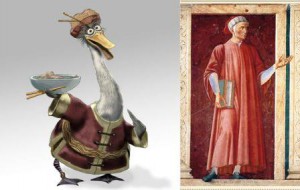I am enjoying a break in my evening for a bit of frivolous entertainment. I was going to watch Bladerunner, but opted for something considerably lighter.
However, in a moment of post-modern self-conscious connection-making I’ll make a connection between this great quote from the movie I am watching and another quote from a favorite work.
First,…
Mr. Ping: Of course. Of course. You have a job to do. Far from home. In a strange city, filled with strange people and strange noodles. Facing horrible danger from which you might never return!
Connect that with:
Tu lascerai ogne cosa diletta
più caramente; e questo è quello strale
che l’arco de lo essilio pria saetta.Tu proverai sì come sa di sale
lo pane altrui, e come è duro calle
lo scendere e ’l salir per l’altrui scale.Thou shalt abandon everything beloved
Most tenderly, and this the arrow is
Which first the bow of banishment shoots forth.Thou shalt have proof how savoureth of salt
The bread of others, and how hard a road
The going down and up another’s stairs.
Okay, that was a downer.
 And, now that I look at the two, the first doesn’t really have all that much to do with the second, …
And, now that I look at the two, the first doesn’t really have all that much to do with the second, …
… except for the point that when you eat unfamiliar food you are more acutely aware that you are not in your native place.
The Florentines of Dante’s time didn’t use salt in their bread. Eating salty bread, therefore, becomes a symbol of the pain of exile. In a similar way, by muscle memory we get used to stairs being of a certain measure, and we learn the feel of the places where we live. When you lose your home and are forced to go to another place, well…. the bread is salty and the steps are hard to climb. Wherever you are, it is someone else’s.
Mr. Ping isn’t really talking about exile, in the sense that he is being driven from his home, but he is talking about being separated from someone he loves. We are restless when we are apart from that which we love. For Christians, this whole world is out of our comfort zone in fundamental ways. We are apart from love, in a strange city, the City of Man. We are in exile trying to get to where we truly belong, where there is vera iustitia, verus amor.
(I’m just multitasking here as I watch the fun eeeeevil peacock.)
Many of you were taught by the sisters in school to avoid the company of bad friends. We can lose our way and stray from the right path. We can be deceived away from the way by bad friends. We are surrounded by dangers in our exile, dear reader. All created things, in way, are false friends who take us to parts unknown, where you find strange noodles. If we aren’t careful, we can be seduced by strange noodles.
We can, in fact, lose what Christ won for us.
Let me noodle this a bit more.
Since Mr. Ping mentioned strange cities, and Augustine wrote the City of God, I’ll stick with Augustine.
Augustine, knew by his science of his age that the weight of a thing was caused by an interior property constantly seeking to go to the place it belongs. That is why Augustine said, “pondus meum amor meus… My weight is my love.” (conf. 13) Our hearts can’t be at peace when given over to any created thing. They will strive to go to God.
In his Confessions Augustine wrote that we are always going to be restless if our hearts are given over to something created. “Fecisti nos ad te et inquietum est cor nostrum donec requiescat in te. …You have made us for yourself, O Lord, and our hearts are restless until they rest in you.” (conf. 1)
In this world our hearts imperfectly in harmony with God and some of us is apart from us and from Him. We won’t truly be at rest until we enjoy the sight of God the Holy Trinity in the Beatific Vision of heaven. We are in exile here in this life. Our true homeland is elsewhere. Augustine often refers to our returning to the patria, our true fatherland. He gives us a pointer about how to get there in a sermon:
Qui ergo tanta potuit, esurivit, sitivit, fatigatus est, dormivit, comprehensus est, cæsus est, crucifixus est, occisus est. Ista est via: ambula per humilitatem, ut venias ad æternitatem. Deus Christus patria est quo imus: homo Christus via est qua imus
He who was capable of such great things, hungered, thirsted, was weary, slept, was taken, struck, crucified, slain. This is the path: walk in humility, that you may come to eternity. Christ, God, is the fatherland to whom we go: Christ, man, is the path by which we go. (s. 123)
If Christ walked that hard path to open that path, we must walk that hard path to attain the goal He won. He is both the goal and means to get there. He did what He did in humility. We must do what we do in humility. He explicitly gave us His Holy Church and the sacraments as the ordinary means by which we can already be with Him which still going to Him. The Church is His way for us to both walk by Him and to Him. We must stick to the path on which Holy Church guides us.
This is all made possible by the indwelling of the Holy Spirit, who breathed life into the Church on that first Pentecost and who makes our hearts His own dwelling in baptism, confirmation and the Holy Eucharist. Apart from the indwelling of the Holy Spirit, the state of grace, we are lost and there can never be true rest for the heart.
Enough riffing.
 In any event, that is how I got from Mr. Ping noodle shop to Augustine’s Christus via et patria.
In any event, that is how I got from Mr. Ping noodle shop to Augustine’s Christus via et patria.
I shall now make some Chinese noodles and enjoy the final moments of the eeeeevil peacock.
BTW… did you know that in ancient Christian art the peacock was a symbol of eternal life? The ancients thought that peacock flesh didn’t decay, and so it was a symbol of immortality.
Moreover, the use in the movie – and I am sure you know which one it is by now – of animation based on Chinese paper shadow puppets was really cool. I first saw them in the Zhang Yimou film To Live (UK HERE… great movie… book, not so much…). Fun moment: the sight-challenged bunny playing the pipa during the battle in the square, a topos in wuxia, I think, blind musicians and battles, such as the great moment in another film by Zhang Yimou, Hero, (UK HERE) in which Nameless and Long Sky fight a battle in their minds as if rains while a blind man plays a guqin.
And to bring this full circle, the actor who did the voice of Mr. Ping – also born in my native place of Minneapolis was also in Bladerunner!
Have a lovely Sunday rest on this beautiful feast of Pentecost.



































Great stuff! It’s fascinating the connections we can make w/ literature, film etc.
And I liked Kung Fu Panda 2 enough to see it twice in theaters.
The road going up and down someone else’s stairs isn’t hard because it is foreign, but because they belong to some else, someone else who can say, “I didn’t like the sound your left foot made on the third stair. Away with you!” [Good observation.]
All their lives long, with the unleavened bread
And bitter herbs of exile and its fears,
The wasting famine of the heart they fed,
And slaked its thirst with marah of their tears.
– Longfellow, “The Jewish Cemetery at Newport”
Ah! I knew I loved your blog for some reason! Kung Fu Panda is my favorite!!!! The animation for both movies was sooooo good!
Lovely reflection.
I do not believe I have laughed so hard – and continuously – at a movie as I did while watching Kung Fu Panda with my wife and boys.
I know Jack Black has – um – issues.
However, the timing and cadence of his dialogue with the other characters – in both movies – was simply classic.
Thanks Father Z for the “lightened” posts today. :)
MSM
More than any other post I can recall on this blog, this one raises the fascinating question of just how much background reading, here and elsewhere, is required for full appreciation. Congratulations, Fr. Z!
Strange, I was listening to a different Mr. Ping tonight:
“O Cina, che or sussulti e trasecoli in quieta,
Come dormivi lieta
Gonfia dei tuoi settanta mila secoli.
Tutto andava secondo l’antichissima regola del mondo.
Ho una casa nell’Homan
Con il suo laghetto blù
Tutto cinta di bambù.
E sto qui a dissiparmi la mia vita
E stillarmi il cervel sui libri sacri.
E potrei tornar laggiù
Presso il mio laghetto blù
Tutto cinta di bambù.”
[AH! Good one! The last time I saw that one was in Rome at the Baths of Caracalla. Quite a long time ago, in the late 80’s. Birgit Nilsson!]
*blink*